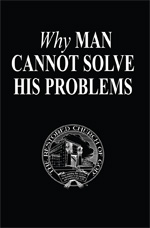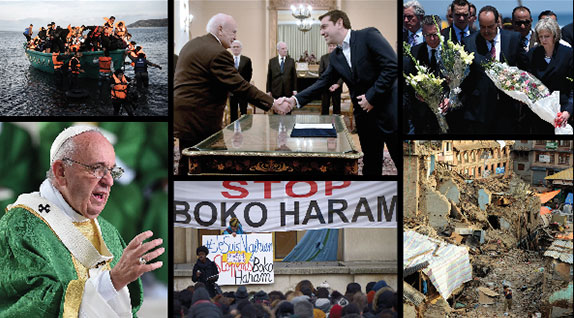 Aris Messinis/ (top left); Vincenzo Pinto/ (bottom left); Aris Messinis/ (top middle); Pius Utomi Ekpei/ (bottom middle); Jeff J Mitchell/ (top right); Ishara S. Kodikara/ (bottom right); AFP/Getty Images
Aris Messinis/ (top left); Vincenzo Pinto/ (bottom left); Aris Messinis/ (top middle); Pius Utomi Ekpei/ (bottom middle); Jeff J Mitchell/ (top right); Ishara S. Kodikara/ (bottom right); AFP/Getty Images
Article
An examination of the previous year shows that something was lacking in humanity’s ability to solve its problems.
Learn the why behind the headlines.
Subscribe to the Real Truth for FREE news and analysis.
Subscribe NowAs with any new year, 2015 started with loads of promise. We were ready to take on the most pressing problems of the day. We could survey the entire planet and see where our actions caused negative effects. Armed with the lessons of 2014, we determined to succeed where we had previously fallen short.
New leaders took the stage. In January, Greece elected Prime Minister Alexis Tsipras who promised to resist European bailout money in return for implementing austerity measures.
As the debt crisis developed over the summer, though, it ended with a return to the status quo. Greece accepted an austerity package and received funds from the EU.
The West, too, looked forward to change—America’s Congress swung to the right as a Republican majority filled the Capitol. Canada tilted to the left in its election of Justin Trudeau for prime minister.
In addition, the 2016 U.S. presidential race heated up, forcing citizens to focus on selecting a new leader of the free world. Australia replaced Prime Minister Tony Abbott with Malcolm Turnbull, a staunch supporter of same-sex marriage and climate change policies.
2015 was also expected to be a year of global economic growth—a final spring out of the lingering effects of the 2008 financial crisis. Lithuania became the 19th country to join the euro, and the Eurasian Economic Union came into effect, linking Russia, Belarus, Armenia, Kazakhstan and Kyrgyzstan.
Despite high hopes, international markets went into turmoil just weeks later.
During the year, China’s economy logged the weakest growth since 2009 and Saudi Arabia’s decision to increase oil output to reduce Iran’s oil profits cost OPEC half a trillion dollars—significantly harming members with smaller economies.
In addition, increased worldwide tragedies brought the reality of society’s security situation crashing down. During the first month of the year, masked gunmen affiliated with Islamic State stormed Charlie Hebdo offices in Paris, killing 12 and wounding several more. That same month, Islamic terrorist group Boko Haram razed the town of Baga, Nigeria, with rocket-propelled grenades and assault rifles, massacring over 2,000 people.
In response to worldwide terror threats, the United Nations adopted Resolution 2199, which forbids member countries from providing resources—including ransom payments—to extremist groups.
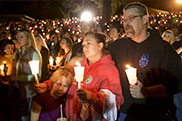 Michael Lloyd/Getty Images
Michael Lloyd/Getty Images Yet this did not stop other acts of terror: the beheading of 21 Coptic Christians in Egypt, a series of shootings across Copenhagen—Denmark’s worst terrorist attack in 30 years—the killing of 20 at a Tunisian museum and subsequent slaughter of dozens more at a beach resort, a man opening fire at a Charleston, South Carolina, church, killing nine, a Muslim gunman taking the lives of four marines in Tennessee, a bomb exploding in Bangkok, Thailand, a Mali hotel attack by an al-Qaeda affiliate, the deadliest bombing in Turkey, the Taliban capturing the first city in Afghanistan in 10 years, and a shooting in California by a married couple with ties to ISIS that left 14 dead and 21 wounded.
Amid these problems, a weary world continued to cling to hope regarding climate change. The overall plan: limit the global rise in temperature to 2 degrees Celsius. Each nation was required to devise a strategy throughout the previous year and report it to the international body by December 2015.
As leaders scrambled to reach environmental solutions, China’s smog reached record levels. Indonesia and the western United States endured their worst bout of forest fires. In addition, about 50,000 square miles of forest worldwide were lost over the 12 months.
News report after news report further eroded hope that 2015 would bring real change. More than 23 shootings on U.S. college campuses took place. Latin America’s worst fiscal year since the global recession occurred. Even Ebola fears resurfaced in November when a 15-year-old Liberian boy became the first victim since the country was declared free of the disease two months earlier.
Society watched as all too familiar situations played out. Each news broadcast made the world’s plight feel bleaker.
With all of man’s advancements, it seems almost incomprehensible that the year should have been this way. Technology allows us to examine the long-term record of history as never before. We should be able to comb the pages of the past to learn from the trial and error of our ancestors—and fix them.
Clearly, humanity missed a crucial lesson from the previous year: that mankind alone cannot solve its problems. A closer examination of various aspects of society in 2015 reveals this in vivid color.
While this knowledge can make the world seem hopeless, understanding this concept is a first step to securing a hopeful future.
Media
Media is a major driver of society. Used correctly, it allows the world to be more connected than ever before, drives advancements in every field of knowledge, and helps humanity see where it is off-track.
More often than not, however, media is improperly used. It strains relationships, blurs the truth, pushes radical agendas, incites violence, and encourages people to become more self-focused than ever before.
The year 2015 was the year for political correctness. This was evidenced in discussions about race such as the case in which an African American man in Baltimore taken into police custody died, setting off a chain of riots throughout the city. Everyone, from newscasters to educators to the average citizen had an opinion.
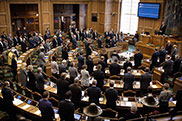 Nils Meilvang/AFP/Getty Images
Nils Meilvang/AFP/Getty ImagesIn addition, the concepts of “microaggressions” in education—that what is being taught could be considered offensive for some students—and “safe rooms”—where students could retreat to drink milk and eat cookies or play with Playdoh if they felt a particular topic was not one they wanted to discuss—came into view.
Because of the convenience of the Internet and society’s push to rush headlong into the digital age, we are just starting to see the long-term effects of an Internet-entrenched society in which 95 percent of the world’s population—just under 7 billion people—are covered by a cellular signal.
Even Oxford Dictionaries’ choice for 2015’s word of the year aptly summed up the use of media in the modern age. The company chose an emoji—an icon used in text messages—commonly known as “face with tears of joy.”
The organization explained their reasoning: “Emoji have come to embody a core aspect of living in a digital world that is visually driven, emotionally expressive, and obsessively immediate.”
This age is visually driven, usually to a fault, the emotions expressed are often shallow, and the obsessive immediacy of the online world robs offline relationships.
Analytics companies regularly find that many only read (mostly skim) articles—yet this does not stop them from sharing it on social media or posting their own thoughts in the comments section.
A lack of deep reading transfers to a lack of deep thinking, which leads to an incredibly myopic worldview. Nowhere is this more prevalent than with political ideals.
In April 2015, The New York Times reported: “With the presidential race heating up, a torrent of politically charged commentary has flooded Facebook, the world’s largest social networking site, with some users deploying their ‘unfollow’ buttons like a television remote to silence distasteful political views. Coupled with the algorithm now powering Facebook’s news feed, the unfollowing is creating a more homogenized political experience of like-minded users, resulting in the kind of polarization more often associated with MSNBC or Fox News. And it may ultimately deflate a central promise of the Internet: Instead of offering people a diverse marketplace of challenging ideas, the web is becoming just another self-perpetuating echo chamber.”
To make matters worse, trust in the news media is at an all-time low. A Gallup poll found that only four in 10 Americans have a “great deal” or “fair amount” of trust in journalists to report current events fairly and accurately. Pew Research found that 65 percent of Americans feel news media has a “negative effect” on the nation.
This distrust and disdain is fueled by a constant skewing of truth. No matter the topic, it is difficult to know what is actually happening in the world.
This was apparent in what was covered throughout 2015. While certain stories received endless coverage, others were only a mild blip on the world’s radar.
At one point during the year, nearly 1,500 lives were lost in the deadliest stampede ever to occur during the hajj pilgrimage in Mecca, Saudi Arabia—one of Islam’s holiest events. Neighboring countries such as Iran blamed the host nation for the disaster, claiming the Saudi government had not done anything to improve the site following deadly stampedes in the past.
Such tragedies, however, were hardly covered by Western nations.
Science & Technology
To be fair, not all 2015 news was negative. The fields of science and technology continued to boom throughout the year, showing that while man may not be able to solve all of his problems, he is indeed capable of incredible feats. Advancements included a light-bending microchip with the ability to operate quantum computers and a jet-propelled drone that flies at record speeds, which was built by a 3-D printer.
This is on top of a successful expedition to Pluto. Launched by NASA in 2006, the spacecraft made its closest passage in July of this past year, capturing photos and collecting data. The images revealed large areas of flat surface, which could imply geological activity on the planet.
While the trip to the dwarf planet showed off the genius of mankind, other news revealed the dual nature of man: incredible advancements coupled with terrible ills.
 Ethan Miller/Getty Images
Ethan Miller/Getty ImagesEarly in the year, a synthetic biology company used lasers to edit DNA—a procedure that allows it to customize living creatures.
“In the works or on the market are color-changing flowers, cow-free milk, animal-free meat, tests that detect diseases from one drop of blood and pills that tell doctors whether you have taken your medicine,” SFGate reported.
With the excitement came a stern warning from bioethicists who believe this could be taken too far. Wired magazine explained: “We now have the power to quickly and easily alter DNA. It could eliminate disease. It could solve world hunger. It could provide unlimited clean energy.”
But the article cautioned, “It could really get out of hand.”
“It could at last allow genetics researchers to conjure everything anyone has ever worried they would—designer babies, invasive mutants, species-specific bioweapons, and a dozen other apocalyptic sci-fi tropes. It brings with it all-new rules for the practice of research in the life sciences. But no one knows what the rules are—or who will be the first to break them.”
In February, Britain voted to allow the world’s first three-parent in vitro fertilization. The process involves using the parents’ normal DNA and substituting unhealthy elements of it with another egg cell’s DNA. Although doctors claim this could prevent some inherited diseases, there are fears it paves the way to eliminating those perceived to have “inferior” genes. (Think Hitler’s “master race.”)
As is always the case, last year, significant resources were invested in technology created for military purposes—to wage war. Boeing collaborated with the U.S. Army to develop a vehicle that can stop projectiles—missiles, drones and mortar shells—with a laser cannon. Once an object is detected, it takes the laser just seconds to lock onto the target and destroy the missile.
“We want to be able to run it [with] a single guy from a single laptop with an x-box controller, something that he doesn’t have to go to school to learn for years and years…” a Boeing representative said.
Business & Economy
Supporting science and technology is the economy. Every idea needs funding for research and development, followed by cash to make products and services available to the public.
As a general rule, with business and economy, though, good news for one party is usually terrible news for another.
Look at the United States: 2015 was a great year for the dollar, according to investorguide.com. The website explained: “Although the US economy has had its ups and downs, the US dollar is still strong. Part of the reason why is how miserable the rest of the world has been doing, but another part is how well the economy has weathered the storm.”
The economies of China, Russia and Brazil all had a “miserable” year, which boosted America’s financial standing. The Canadian dollar and Mexican peso also struggled to keep up with U.S. currency.
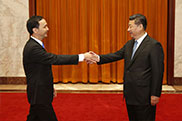 STR/AFP/Getty Images
STR/AFP/Getty Images In June, Zimbabwe discarded its fiduciary system to stem ongoing hyperinflation. Citizens began trading Zimbabwean dollars for U.S. ones, with the maximum amount that could be exchanged 175 quadrillion ZD to 5 USD. The switch, however, has done little to ease the country’s woes.
Another fiscal problem was corruption. Five large world banks—JPMorgan, Barclays, Citigroup, RBS and UBS—were fined $5.7 billion for manipulating money markets.
While some businesses prospered, others brought scandals on themselves. Volkswagen hired a new CEO after the German automobile company was caught cheating on diesel emissions tests in order to pass its vehicles off as eco-friendly cars. As a result, the company lost billions of dollars and VW was forced to recall 8.5 million cars.
Even non-profit groups were subject to corruption. FIFA’s president stepped down after seven executives within the company were indicted on money laundering. The U.S. Attorney General determined that corrupt FIFA officials pocketed $150 million in bribes extending from offers to select which country would host, televise and organize the World Cup soccer games.
Government
Political upheavals and governmental change worldwide also revealed that we had failed to learn lessons from previous years and further supported the idea that mankind as a whole is incapable of solving its problems entirely.
In the U.S., ideological clashes and political vitriol—over immigration, economic problems, climate change, and so on—became more rampant than ever before. A Santa Fe Institute study published in research journal PLOS One in April 2015 found that “partisanship or non-cooperation in the U.S. Congress has been increasing exponentially for over 60 years with no sign of abating or reversing.”
Across the Atlantic, the United Kingdom made clear its dissatisfaction with its place in the EU when it reelected Prime Minister David Cameron who promised to hold an in-out referendum on whether the UK should remain in the bloc.
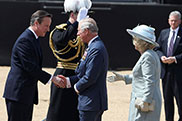 Steve Parsons - WPA Pool/Getty Images
Steve Parsons - WPA Pool/Getty ImagesIn addition, governmental conflicts spawned global problems. The four-year civil war in Syria between its current president and rebel groups was further complicated by attacks from the Islamic State.
Both ISIS and the Syrian conflict have caused thousands of refugees to flock to Europe. After an overcrowded ship capsized in the Mediterranean Sea in April, killing over 800, however, nations on the world put pressure on Europe to open its borders. According to the most recent data by the UN Refugee Agency, close to 60 million people have been displaced due to conflict, persecution, generalized violence, or human rights violations—the highest number ever recorded.
“To those that think that it doesn’t matter because humanitarian organizations will be there and able to clean up the mess, I think it’s important to say that we are no longer able to clean up the mess,” UN High Commissioner for Refugees Antonio Guterres warned at a press briefing. “UN agencies, NGOs, the Red Cross—we no longer have the capacities and the resources to respond to such a dramatic increase in humanitarian needs.”
This issue was laid out by the Wilson Center in a report released at the beginning of the year: “The biggest threat of 2015 is from extremists who have taken control in places where peaceful change dissolved into violence, notably Syria, Iraq and Libya, from the Islamic State and al Qaeda franchises such as al Qaeda of the Arabian Peninsula and al Nusra Front. These groups have redefined the region both politically and geographically; they now control territory and have drawn international support of more than 18,000 foreign fighters. The impact has also created the world’s worst humanitarian crisis since World War II, producing 3.8 million refugees that have spilled over into Turkey, Lebanon, Jordan and Iraq—with no end in sight to either the war or its consequences in the region.”
Throughout the year, these words rang truer than any could have imagined. According to The Economist, more were killed in Europe by Islamist attacks this past year than the past five years combined. In 2015 alone, the Islamic State enslaved 3,000 to 5,000 women.
Another thorny issue for the world was relations between Israel and Palestine. In March, following a controversial speech to the U.S. Congress, Israel reelected Prime Minister Benjamin Netanyahu. The prime minister promised “that no Palestinian state would be established as long as he remained in office,” The New York Times reported.
Months after Mr. Netanyahu’s new term began, beginning with Jewish Rosh Hashana celebrations, Palestinian stone throwers met Israeli police in a show of aggression after Jewish radicals attempted to assert their right to pray there—something forbidden by Palestinian authorities and adhered to by most Israelis. Since then, the conflict has spread throughout the region, with a spate of stabbings sparking increased security measures throughout the nation.
To confront challenges in the region, nations of the Arab League formed a military coalition for the first time. Spearheaded by Egyptian President Abdel Fattah al-Sisi and the Saudi government, the joint armed force was used to counter the Iran-backed Houthi, who ousted Yemeni president Abd-Rabbu Mansour Hadi from the capital of Sanaa in January.
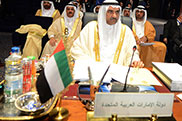 Mohamed El-Shahed/AFP/Getty Images
Mohamed El-Shahed/AFP/Getty ImagesThe deterioration of relations between Russia and Turkey did not make the Middle East’s situation any better. In November, a Turkish warplane shot down a Russian combat jet during an airspace dispute, an action President Vladimir Putin claimed was a “stab in the back” by the “accomplices of terrorists.” Russia responded by imposing economic sanctions on Turkey.
For political successes of 2015, many would turn to the multi-national agreement regarding Iran’s nuclear program and renewed relations between America and Cuba.
Yet even both of these were not without controversy.
Proponents of the Iran deal contend that it will prevent the nation from producing nuclear weapons. Others feel it will only delay Tehran from obtaining them—and still others question if the nation will deliver on its promises at all.
Regarding the U.S. and Cuba, citizens of both nations watched with amazement as Presidents Raul Castro and Barack Obama announced that after more than 50 years, they were reestablishing diplomatic relations. Opponents of the shift say it evidences growing American weakness on the world stage.
To the surprise of many, Pope Francis played a significant role in the policy change between Havana and Washington. His letter to both presidents urging them to “initiate a new phase in relations” essentially jumpstarted the entire process and led to the reconciliation.
Religion
The steady stream of unsettling news pushed many to look beyond the physical for answers. With the occurrence of four consecutive lunar eclipses in April and September of 2014 and 2015, dubbed “blood moons,” talk even turned to the “end of the world.”
One writer purported that each “tetrad” was a sign of serious consequences on the horizon. A bout of severe Palestinian terror attacks in Jerusalem throughout September and October added to the theory.
This, coupled with significant natural disasters occurring or intensifying this year, made the concept that we were in the end-times more believable.
For example, in April, a magnitude 7.8 earthquake struck Nepal, killing more than 8,000. On May 12, another earthquake in the nation caused 390 additional deaths. In June, a severe heat wave in India, resulting in temperatures as high as 118 degrees Fahrenheit, killed over 2,300—one of deadliest recorded in the nation.
This is in addition to extreme droughts in California, Brazil, Zimbabwe, and North Korea, a typhoon in the Philippines, a cyclone that hit Vanuatu islands, a Guatemalan landslide that killed dozens, the largest earthquake to hit Chile in years, a South Asian earthquake that killed hundreds in multiple countries, and the strongest Pacific hurricane to make landfall in history.
While such events drive some toward religion, the state of the world is also increasingly driving many away from it. A May 2015 Pew Research Center report found that among Americans born between 1981 and 1996, 35 percent claim to have “no religion,” a group also known as “nones.” This number is only 11 percent for those born between 1928 and 1945.
The Telegraph reported on the news: “While America still remains outwardly far more religious than Europe, the sudden rise of the ‘nones’…has raised the question of whether the US is on the cusp of a dramatic sea-change in attitude towards religion in public life.”
Such a substantial move away from religion has led many to question long-established morals and values. The changes can be seen in the 2015 Supreme Court decision to legalize same-sex marriage in all 50 states and more widespread acceptance of those who identify as transgender.
Mainstream religions have been struggling with how to reach a society that differs so greatly from traditional beliefs.
Catholic leader Pope Francis—who heads the largest denomination of professing Christians on Earth—has succeeded in capturing public attention. But even his parishioners are moving away from traditional doctrines of the church.
Among U.S. Catholics, Pew found that 84 percent believe unmarried parents living together is an acceptable way to raise children. Also, 87 percent feel the same about single parenting, 83 percent for divorced parents, and 66 percent for same-sex couples.
Shifts in societal values have also changed how family is defined, which presents a host of challenges. A joint study from Princeton University and the Brookings Institute stated: “Research clearly demonstrates that children growing up with two continuously married parents are less likely than other children to experience a wide range of cognitive, emotional, and social problems, not only during childhood, but also in adulthood.”
Such positive effects—which include higher education, income, occupational status, and employment rates—are even more pronounced when children are raised by their biological fathers and mothers.
The move away from a nuclear family means society must identify and attempt to counteract the negative effects of nontraditional living arrangements.
In an effort to emphasize traditional family values, Francis visited the United States in September—the fourth pope to visit the nation. He followed this with a trip to Africa just two months later, during which he became the first pope to travel to an active warzone.
Missing Element
The theme of mankind not able to solve its problems runs through all aspects of society.
Consider what the world endures, a cycle of seemingly endless adversity coupled with prosperity. While man continues to achieve, he also continues to suffer.
Examining history is a crucial first step to understanding this. When looking back through the centuries, a curious pattern emerges: the paradox of man. He is capable of incredible advancements, yet they are always coupled with terrible ills.
Notice three examples:
- The Romans built the magnificent Colosseum—and then watched gladiators and animals hack, gouge and tear each other to pieces.
- The Mayans were producing durable rubber products 3,000 years before American Charles Goodyear filed for a patent in 1843—yet their religion revolved around grotesque bloodletting and human sacrifice.
- The U.S. sent men to the moon—yet also invented and used atomic weapons to take human life.
Man has longed for peace for millennia. With all the time and effort put into this pursuit, history should reveal a clear path to prosperity and happiness. Instead, it is an endless record of warfare, religious clashes, and failed governments. It brims with cautionary tales about what not to do. It shows that there is truly nothing new under the sun.
Real Truth Editor-in-Chief David C. Pack expounded on this concept in his book Why Man Cannot Solve His Problems: “While the world is suffering from ‘information overload,’ none of this knowledge increase is truly addressing mankind’s growing number of complex, insoluble problems. With all of man’s creative ingenuity and intelligence, he cannot solve the most important problems—those that threaten his very existence on an earth he is systematically destroying.”
Why?
Mr. Pack answers: “Every effect can be traced to one or more causes. Unwanted or illegitimate pregnancies, crime, drug addiction, bankruptcy and a thousand other effects, can all be linked to specific causes. Create your own list. You may find it to be almost endless.
“The King James Version of the Bible teaches, ‘…the curse causeless shall not come.’ Two other translations of this verse are ‘…the undeserved curse will never hit its mark’ (Jerusalem Bible), and ‘…the baseless curse never goes home’ (Moffatt). This scripture is saying that every difficulty carries a reason—there is a CAUSE for every EFFECT!
“Why can man not see this law at work when he looks at the world as a whole? Why is it that no one is looking for the cause of this world’s ills and evils? Why are educators not teaching this most important of all principles? As you look at the world around you, are you concerned with it? Do you ever wonder WHY it is filled with misery, unhappiness and discontent? And why has even the Christian religion ignored this important relationship between cause and effect?
“The cause of all the world’s troubles began in the Garden of Eden. As simple as this sounds, it is true. The world has lost sight of a decision made by Adam and Eve. They chose not to eat of the Tree of Life, choosing instead to eat of the tree of the knowledge of good and evil. Have you ever wondered what would have happened if those two people had chosen the Tree of Life? Think of how this would have changed the entire world! Everything would be different.
“There would be no armies, wars, death, devastation or displacement of peoples. There would be no famine or hunger because there would be plenty of food for everyone. There would be no doctors, because there would be no illness. All of the hospitals and clinics would never have existed. Neither would the prisons, jails, judges, courts and police forces that exist to punish lawbreakers.
“Universal happiness, abundance, prosperity and peace would have been experienced worldwide. All people would get along—neighbors, families, individuals and nations. Can you imagine such a world?
“When Adam and Eve made the wrong decision, it directly affected you and me! They brought untold effects upon humanity, because of their single wrong CAUSE—and this has not been understood prior to the 20th Century.”
This is vital knowledge the world has missed! If it had understood this in 2015, it would have seen that only by turning to God could it solve its problems and really make this year better than the last.
The Real Truth is the only magazine of its kind on the face of the Earth that reveals this knowledge.
To understand more of what society misses, keep reading this publication. Its world news analysis through the lens of the Bible keeps its readers abreast of what is happening, why it is happening, and what is to come.
True knowledge from God’s Word is accessible to you if you are willing to seek it!

